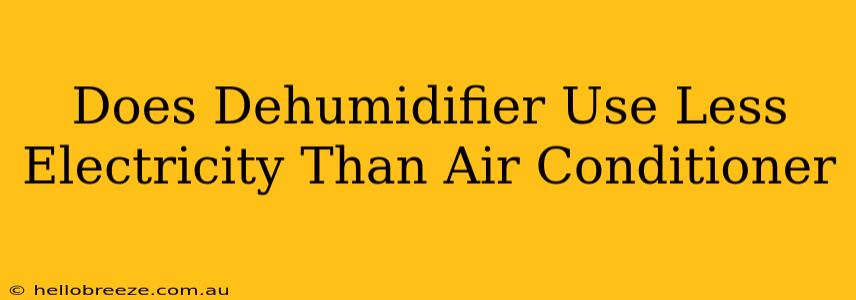Does a Dehumidifier Use Less Electricity Than an Air Conditioner?
Summer's heat and humidity can make your home feel uncomfortable. Many people turn to air conditioners for relief, but dehumidifiers offer a potentially more energy-efficient alternative, at least for certain situations. So, does a dehumidifier use less electricity than an air conditioner? The simple answer is: it depends.
Let's delve into the specifics to understand when one is more energy-efficient than the other.
Understanding Energy Consumption: Dehumidifiers vs. Air Conditioners
Both dehumidifiers and air conditioners cool the air, but they achieve this in different ways, leading to varying energy consumption.
-
Air Conditioners: These are designed to significantly lower the temperature of a room or entire house. They use refrigerants to cool the air, consuming a considerable amount of electricity, especially in larger units or during extended periods of use. The larger the space you're cooling, and the greater the temperature difference you're aiming for, the higher the electricity consumption will be.
-
Dehumidifiers: Primarily designed to reduce moisture in the air, dehumidifiers extract water vapor, lowering humidity levels and making the air feel cooler. They generally consume less electricity than air conditioners, especially when the goal is simply to improve comfort without drastically reducing the temperature. A small, portable dehumidifier will use far less electricity than a central air conditioning system.
When a Dehumidifier is More Energy-Efficient
A dehumidifier shines when:
- Humidity is the primary concern: If you live in a humid climate and only need to lower the humidity, a dehumidifier will be considerably more energy-efficient than running an air conditioner.
- Mildly warm temperatures: In situations where the temperature isn't excessively high, a dehumidifier can significantly increase comfort levels by reducing the stickiness of the air without the energy expenditure of a full-blown air conditioner.
- Smaller spaces: Dehumidifiers are often more efficient in smaller areas like basements or individual rooms, whereas air conditioners are more effective in larger areas.
- Spot treatment: Need to tackle moisture problems in just one room? A dehumidifier is a targeted solution that avoids cooling the entire house unnecessarily.
When an Air Conditioner is More Energy-Efficient
An air conditioner remains the better choice when:
- High temperatures: When temperatures soar, a dehumidifier will struggle to provide adequate cooling. An air conditioner is necessary for significant temperature reduction.
- Large spaces: Cooling a whole house effectively requires the power of an air conditioning system.
- Comprehensive cooling: Air conditioners offer a more complete solution for maintaining a comfortable temperature and humidity level.
Factors Affecting Energy Consumption
Several factors impact the energy usage of both appliances:
- Unit size and efficiency: Larger units consume more energy, regardless of whether it's an air conditioner or a dehumidifier. Look for energy-efficient models with high Energy Star ratings.
- Usage duration: The longer the appliance runs, the more electricity it consumes.
- Ambient temperature and humidity: Higher temperatures and humidity require more energy to achieve the desired level of comfort.
Conclusion: Choose the Right Appliance for Your Needs
The most energy-efficient choice depends entirely on your climate, the size of the space you're trying to cool, and your specific comfort needs. If humidity is your main concern and the temperature is mildly warm, a dehumidifier might be a more energy-efficient solution. However, for significant temperature reduction, especially in hot climates, an air conditioner is indispensable, even if it uses more energy. Carefully consider your needs before making a purchase to ensure you select the most appropriate and efficient appliance for your home.

